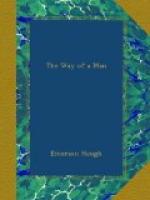“Oh, I say, my friend,” he rejoined—“my name’s Orme, Gordon Orme—I’m just stopping here at the inn for a time, and I’m deucedly bored. I’ve not had leg over a decent mount since I’ve been here, and if I might ride this beggar, I’d be awfully obliged.”
My jaw may have dropped at his words; I am not sure. It was not that he called our little tavern an “inn.” It was the name he gave me which caused me to start.
“Orme,” said I, “Mr. Gordon Orme? That was the name of the speaker the other evening here at the church of the Methodists.”
He nodded, smiling. “Don’t let that trouble you,” said he.
None the less it did trouble me; for the truth was that word had gone about to the effect that a new minister from some place not stated had spoken from the pulpit on that evening upon no less a topic than the ever present one of Southern slavery. Now, I could not clear it to my mind how a minister of the gospel might take so keen and swift an interest in a stranger in the street, and that stranger’s horse. I expressed to him something of my surprise.
“It’s of no importance,” said he again. “What seems to me of most importance just at present is that here’s a son of old Klingwalla, and that I want to ride him.”
“Just for the sake of saying you have done so?” I inquired.
His face changed swiftly as he answered: “We owned Klingwalla ourselves back home. He broke a leg for my father, and was near killing him.”
“Sir,” I said to him, catching his thought quickly, “we could not afford to have the horse injured, but if you wish to ride him fair or be beaten by him fair, you are welcome to the chance.”
His eye kindled at this. “You’re a sportsman, sir,” he exclaimed, and he advanced at once toward Satan.
I saw in him something which awakened a responsive chord in my nature. He was a man to take a risk and welcome it for the risk’s sake. Moreover, he was a horseman; as I saw by his quick glance over Satan’s furniture. He caught the cheek strap of the bridle, and motioned us away as we would have helped him at the horse’s head. Then ensued as pretty a fight between man and horse as one could ask to see. The black brute reared and fairly took him from the ground, fairly chased him about the street, as a great dog would a rat. But never did the iron hold on the bridle loosen, and the man was light on his feet as a boy. Finally he had his chance, and with the lightest spring I ever saw at a saddle skirt, up he went and nailed old Satan fair, with a grip which ridged his legs out. I saw then that he was a rider. His head was bare, his hat having fallen off; his hair was tumbled, but his color scarcely heightened. As the horse lunged and bolted about the street, Orme sat him in perfect confidence. He kept his hands low, his knees a little more up and forward than we use in our style of riding, and his weight a trifle further back; but I saw from the lines of his limbs that he had the horse in a steel grip. He gazed down contemplatively, with a half serious look, master of himself and of the horse as well. Then presently he turned him up the road and went off at a gallop, with the brute under perfect control. I do not know what art he used; all I can say is that in a half hour he brought Satan back in a canter.




